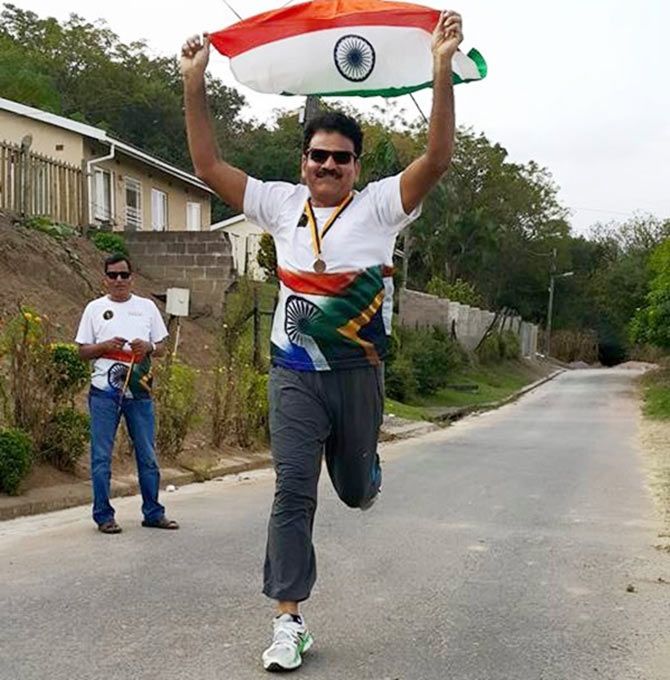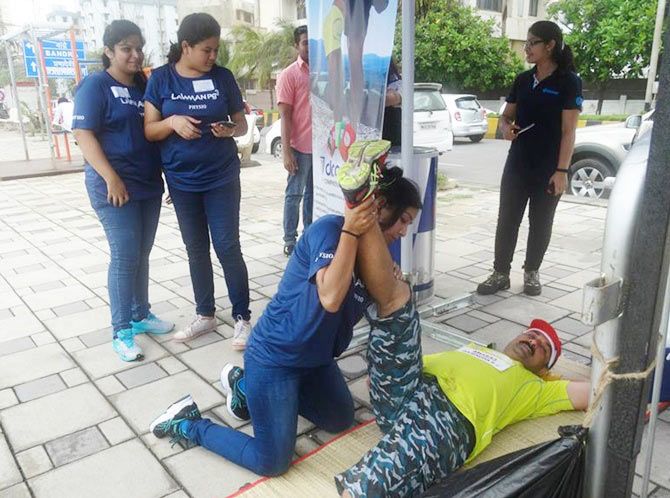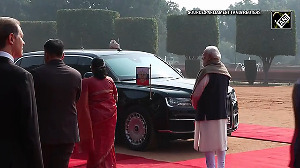Dr Anand Patil hopes to spread the message of embracing a healthy lifestyle.

While many of us flee the hustle and bustle of Mumbai on this long Independence Day weekend, and the others left in the city enjoy some extra hours of sleep, Dr Anand Patil and 100 others runners will sweat it out in Mumbai on August 15.
The event -- organised by runners at the Shivaji Park Marathon Club -- aims to encourage more people to embrace a healthier lifestyle by including running in their daily lives.
Mumbai's own ultra-marathon (a long distance running event which is over the marathon distance of 42.2 km) will turn three.
The Independence Day Ultra begins from Shivaji Park to Worli Seaface, both in central Mumbai, and back.
The run will be flagged off at 5 am and will go on till 5 pm, which means runners will run for 12 hours continuously.
This Ultra does not cover a fixed distance; it is more about the time -- 12 hours of running.
For the 52-year-old trauma surgeon who has lived in Shivaji Park for the last 36 years, the Mumbai Ultra Run is his home run. He calls it his "home race on home ground."
The uniqueness of the event doesn't stop at just the number of hours of running, but also the way it is organised.
"I have been running the Comrades marathon (one of the oldest marathons in South Africa, 89 km) and Ironman events (a triathlon which includes a 3.86 km swim, a 180.25 km cycle ride and a 42.2 km marathon run), but the Mumbai Ultra Run is different," says Dr Patil.
"I generally finish the Comrades marathon in 10 hours. I am just curious to know how I'd perform this year," he says.
Want to know more about this man and how he stays so fit? As Dr Patil shares his wisdom, Rediff.com's Laxmi Negi listens in.

How did you start running?
Almost 10 years ago, I met my friend and he was shocked to see me. I was 107 kg.
His reaction made me take my health seriously. I instantly took to running. I am 87 kg now.
When I met another old friend yesterday, he was shocked to see me too, but in a positive way. He complimented me on my fit body.
It feels good and that's what keeps me going.
What are the precautions one must take before signing up for a marathon like this?
1. Maintain your heart rate
Your average heart rate is 70 to 90 beats per minute. The maximum it can reach is 230.
I am 52 and while I am running my heart rate should be 180 beats per minute.
A runner should take care that it shouldn't go beyond that and run in their comfort zone.
If there is any discomfort or problem while running, they should stop immediately.
2. Hydration
While running for 1 km, 50 ml of water is lost from the body. In one hour almost half litre is lost.
So, if a person is running for 10 to 12 hours, almost 5 litres of water is lost from his/her body.
It causes dehydration and might lead to further complications. Hence, on these long excruciating runs, every hour, at least half litre water should be replaced in the body.
3. Calories
An average person with an average BMI (body mass index) loses 100 calories per kilometres.
So, in 12 hours almost 10,000 calories are lost. That's why breakfast and lunch is provided in ultramarathons.
4. Salt
Every km, 1 gm of salt is lost from the body. While running for 12 hours, 50 to 60 gm of sodium chloride is washed away from the body as we are sweating.
During the Mumbai Ultra Run, look forward to the oranges dipped in salt. It replenishes the body in no time.
5. Chaffing and blisters
These are a part and parcel of an ultramarathon runner's life. But that doesn't mean one shouldn't take care.
Before the run, proper stretching is a must.
Don't forget to apply petroleum jelly under your arms and feet.

What are the other things runners should keep in mind?
These days, there are a lot of runners collapsing at the finish line. They should be aware of their limits.
Runners should not get carried away in the heart of the moment. Also, people with a BMI of above 25 should especially be careful not to get unrealistic, as their weight might hinder their performance.
Runners with less than 20 BMI rarely face this issue.
For example, as a recreational runner of 50 plus age, running a marathon under four hours is fantastic. That means you are running one km under six minutes.
Running with a heart rate of above 100 beats per minute for four hours can take a toll on your heart. It is not everybody's cup of tea.
Also, a lot of recreational runners go for fancy supplements, sports drinks and tablets. Some even take steroids to enhance their performance. At an amateur level, these are not required.
I have been running for almost 10 years now and never used any chemicals.
I am an organic runner (chuckles).
How can running change a person's lifestyle?
Brings discipline: Apart from a surgeon, I run an educational institute and also have interest in agriculture sector. I can juggle all these sectors only because of my running.
I wake up at 5 am and hit the Shivaji Park ground by 5.30 am, after which my friends and I run two hours or 10 km. On weekends, it stretches to 15 km.
Since, my day starts early, I can organise my day efficiently. My decision making powers have also evolved.
Keeps the body in good shape: Running regularly keeps muscles in action and the body in good condition.
Feel-good hormones: When you run at least for an hour, your body's chemistry improves and endorphins -- dopamine and serotonin -- are released.
The more you run, the more endorphins are released and your mind reaches a level where it begins to feel good.
Running also helps you become a better person. As serotonin is released from your body, it helps in making you more socially oriented.
For weight loss, will you suggest running or walking?
I will suggest running after walking.
If you are a good walker, you are moving all your body parts. The buttocks and stomach are the problem area of Indians and walking helps reduce that fat in that area.
While walking, you are landing and lifting; so your core muscles don't have much role to play.










